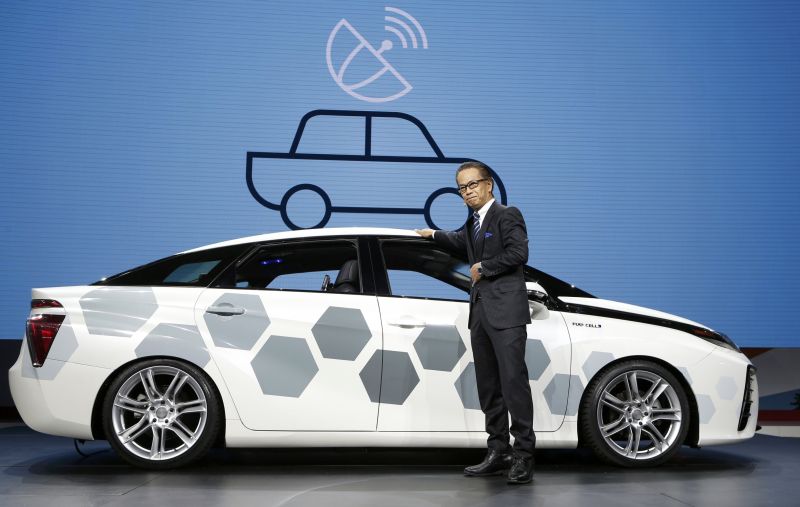 Senior Managing Officer of Toyota Motor Corporation Shigeki Tomoyama is already looking to the skies and satellites for the next innovation. – Reuters pic, January 13, 2016.With the launch of the latest-generation Crown in October, Toyota can already claim to be the builder of the world's first mass-produced truly connected car but rather than rest on its laurels, the company is already looking to satellites as a means of taking the technology to another level.
Senior Managing Officer of Toyota Motor Corporation Shigeki Tomoyama is already looking to the skies and satellites for the next innovation. – Reuters pic, January 13, 2016.With the launch of the latest-generation Crown in October, Toyota can already claim to be the builder of the world's first mass-produced truly connected car but rather than rest on its laurels, the company is already looking to satellites as a means of taking the technology to another level.
A common theme at this year's Detroit Auto Show and at CES, which wrapped last week, has been that of enhanced automotive connectivity. The connected car is well on the way to becoming a mainstream mainstay.
And while models from the likes of Audi and Mercedes rolling out over the coming year connect to each other, servers and traffic infrastructure via a combination of 3G and 4G/LTE and dedicated WiFi frequencies, Toyota is already looking to the skies and to satellites for the next innovation.
For instance, what happens when there's no cellular coverage or when a car crosses a country's border and therefore encounters roaming charges, or if huge amounts of information need to be delivered? Then that's where satellites could come into their own.
"For several years, Toyota met with emerging companies around the world to investigate new technologies," said Shigeki Tomoyama, Senior Managing Officer of Toyota Motor Corporation.
Sending and receiving information via satellite is not a new technology, but, it meant using a large, curved dish – whether to the roof of a car or that of a building. But Toyota's breakthrough, in partnership with US firm Kymeta, allows faster transfer speeds and a flat antenna that can automatically ‘steer' towards a signal and that can be easily and seamlessly integrated into a car's roof.
"We were very excited to learn about Kymeta, because their flat antennae technology could solve the challenge of vehicle-based satellite communications," said Tomoyama.
The firms have been working on the technology since 2013 and at this year's Detroit event are showcasing the first fruits of their labors in the form of a specially adapted Mirai fuel cell car.
"We're excited to be working with Toyota on this next generation of vehicle connectivity," said Dr. Nathan Kundtz, CEO of Kymeta. "Kymeta is the first company to successfully demonstrate this type of technology, and we have over 8,000 miles of road testing with cars connected to satellites."
As well as enabling faster transfer speeds, satellites could signal or manage a fleet of vehicles around the globe or for better-protected and shielded communication. Something that could be crucial for a connected fleet of vehicles responding to a natural disaster, for instance. – AFP, January 13, 2016.

Comments
Please refrain from nicknames or comments of a racist, sexist, personal, vulgar or derogatory nature, or you may risk being blocked from commenting in our website. We encourage commenters to use their real names as their username. As comments are moderated, they may not appear immediately or even on the same day you posted them. We also reserve the right to delete off-topic comments